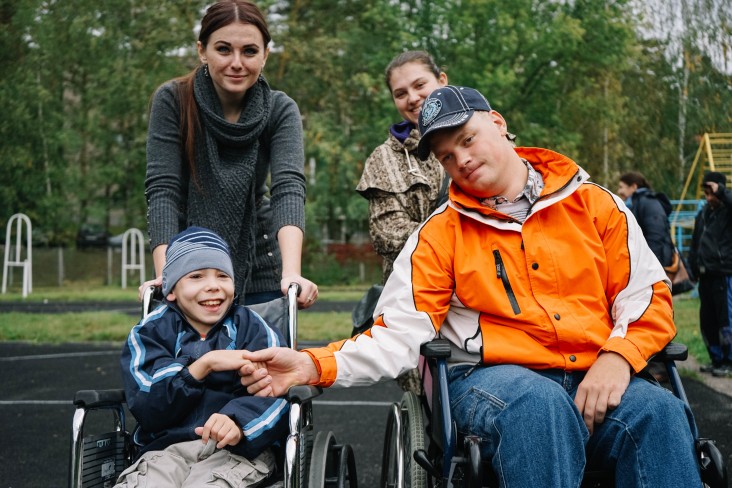Speeches Shim

The Challenge
in 2015, Belarus acceded to the UN Convention on the Rights of Persons with Disabilities (PWD), critical for a country with 562,800 people with disabilities, or 5.9 percent of the population. This breakthrough resulted from many years of advocacy campaigns by disabled people’s organizations. Recently, the government of Belarus made significant strides towards better inclusion of PWD. There is a strong need for expertise and best practices to promote the full integration of PWD and other vulnerable groups.
Program Objectives
-
Form a positive attitude towards persons with disabilities, expand their opportunities, and promote their inclusion
-
Reduce trafficking in persons (TIP) through awareness raising and promoting safe job searches
-
Improve assistance to and reintegration of victims of trafficking
-
Strengthen the capacity of local civil society organizations (CSOs) to provide support services to vulnerable groups.
Overview
USAID assists disadvantaged groups, such as vulnerable children, people with disabilities (PWD), people at risk of trafficking and trafficking victims, through developing community-based services, strengthening the capacities of organizations providing support to these populations, and enhancing advocacy efforts to promote their rights and increase public awareness.
Our Programs
Expanding Participation of People with Disabilities
USAID activities enhance social and economic inclusion of PWD by building the capacity of local organizations that serve PWD. USAID helps these CSOs to establish and provide a range of services, improve their ability to promote disability issues on the national agenda, and advocate for PWD rights. USAID also promotes inclusive education as a way of integrating PWD into society.
Since 2014, USAID has supported the Art for Inclusion of People with Disabilities project implemented by the Belarusian Association of Assistance to Children and Young People with Disabilities (BelAPDIiMI). The project helps improve attitudes, expand job opportunities and cultivate inclusion and acceptance of PWD in Belarusian society. USAID continues its partnership with this local NGO in all six regions of Belarus with a capacity-building program and grant support. USAID supports 30 regional CSOs in strengthening organizational development, improving the range and the quality of services for PWD and their families, and developing social enterprises to provide jobs for youth with disabilities.
Countering Trafficking in Persons
USAID continues to support Belarus in its efforts to counter TIP by strengthening CSOs. This project, implemented by the International Organization for Migration (IOM), focuses on assistance to victims of trafficking (VOTs) and provision of reintegration services. Other activities include a targeted information campaign to increase Belarusians’ awareness about the dangers of trafficking, and promotion of safe job searches for vulnerable groups. USAID assistance helps strengthen Belarus’ capacity to counter TIP though a National Referral Mechanism (NRM).
Program Highlights
Supporting Orphans and Vulnerable Children
- From 2006-2015, USAID in partnership with Child Find International worked to promote at-home family care. USAID contributed to increasing the effectiveness of the child protection system and enhancing family-type placements and rearing opportunities for orphans. USAID activities engaged 168 communities in all regions of Belarus.
- The nationwide level of institutionalization of children in adversity decreased from 29.4% in 2005 to 16.5% in 2014; the average level of institutionalization in 12 core project communities dropped to 1%.
- USAID promoted an internationally recognized model for fostering and adoption of children called Parental Resources for Information, Development and Education (PRIDE). Education authorities accepted PRIDE for implementation through a cadre of PRIDE trainers in 24 towns.
- Since 2006, 16,783 children and 19,318 adults were served by 718 new or improved services for orphans and vulnerable children in 168 geographic locations.
- USAID supported the creation of a network of six re-training institutes for educators and child welfare workers promoting de-institutionalization.
- New regulations on child welfare were developed including Standards and Methodological Recommendations for Investigation of Child Abuse and Neglect, and Standards on Social Rehabilitation for Families at Risk.
Expanding Participation of People with Disabilities
- USAID supported more than 100 new or improved services for PWD through small grants to CSOs advocating for and serving PWDs, including respite care, job placement, mobile support services, and others.
- A national Master Plan for Inclusive Education in Belarus was developed.
Art for Inclusion of People with Disabilities
- Over 800 specialists and volunteers have been trained in advocacy for PWD rights.
- Research on evaluating the PWD stigmatization level among young people informed an awareness campaign that reached over 500,000 people through creative events promoting inclusion and reducing stigma. A training peer-to-peer manual was designed to increase awareness among youth.
- Through small grants support, 14 organizations improved access to social services and employment opportunities for youth with disabilities.
- USAID local partners participated in a government working group to develop a roadmap for implementing the UN Convention on the Rights of Persons with Disabilities. As a result, over 25 recommendations were included in the National Plan on Implementing the Convention for 2017-2025, 13 of which were already adopted.
Countering Trafficking in Persons (TIP)
- USAID’s support to IOM led to the creation of a counter-trafficking in persons network of 19 local CSOs, which USAID continues to support.
- In 2017, over 2,400 people improved their awareness on the dangers of TIP; over 200 VOTs received rehabilitation and reintegration services. As a result of safe job-seeking training, the employment rate of VOTs reached 56%, a 13% increase since 2016.
- The USAID-supported national toll free hotline and online consultation services provide information on safe travel to 144 countries. In 2017, 3,500 phone calls and 300 online inquiries were fielded.
- To date, more than 2,900 people received job-skills training conducted by CSOs and independent instructors trained with USAID support. USAID partner awareness-raising and educational events on the dangers of TIP reached 80,000 representatives of at-risk groups, including youth.
- Since 2005, almost 950 VOTs received reintegration assistance.

Comment
Make a general inquiry or suggest an improvement.